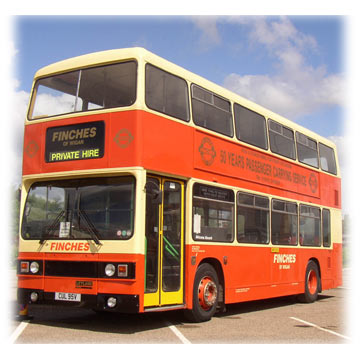Season Tickets and Recreational Travel in Greater Manchester
'A Fare Deal For You' over the last century (Page 3)
Contents
- Introduction
- Diminishing Returns
- On Board for Increased Patronage
- Ticketing Timeline
- Tickets Past and Present
Both GMS Buses and GM Buses North remained in employee ownership till April 1996. After fighting off bids from British Bus (now today's Arriva) and West Midlands Travel (now part of National Express), GMS Buses was the first to be sold. In March 1996 it became part of Stagecoach Holdings. The Perth based company was no stranger to Greater Manchester, having at the time owned Ribble for seven years. Under the moniker of Stagecoach Manchester, operated from its Ribble subsidiary, it competed against GMS Buses on the Wilmslow Road corridor, before selling its route to Finglands.
A month after, GM Buses North succumbed to FirstBus. The Aberdeen based company, formed by the merger of the GRT Group and Badgerline, had at the time already owned Pennine through Potteries Motor Traction. Under Stagecoach Holdings ownership, GMS Buses adopted the 'Stagecoach Manchester' name previously used by Ribble for their journeys on the 42 route.
Within its first year, Stagecoach aimed to make a maximum impact. In the summer of 1996, the Network 7 was reduced in price to £5.00 from £10.00. The impact was almost immediate leading to most Stagecoach Manchester passengers using prepaid weekly or monthly tickets. The result of which has seen increased boarding times at the start of each weekday caused by passengers renewing tickets. This led to Stagecoach Manchester launching a 4 week Megarider by 2008. Instead of being bought on the bus, it is only available online.
The following year saw the Network 7 ticket renamed the 'Manchester Megarider'. Since the launch, passengers aboard Stagecoach Manchester routes increased from 71 million to 85 million over ten years. Since its launch price of £5.00, the ticket returned to its £10.00 price tag in 2008.
Pushing the boundaries
With both the big bus owning groups consolidating in Greater Manchester and the rest of Britain, their season tickets became nationally recognised brands. Out went the regional names for each season ticket and in came almost universally known brand names. With the Big Three bus owning groups also rail franchise holders, a national brand became more important.
Whereas Stagecoach persisted with regional names for its season tickets, FirstGroup (as known since 1998 following the acquisition of Great Western Holdings) were the first to ditch its regional names. From 2001, all daily, weekly and monthly tickets were prefixed with 'First'. Its daily tickets became known as 'FirstDay', weekly tickets 'FirstWeek' and monthly tickets 'FirstMonth'.
2002 saw First Manchester expanding the validity of its FirstDay to West Yorkshire. This remains in use today, making it possible for the passenger to travel from Warrington to Leeds for £4.00 (2009 prices). Arriva North West, making further inroads into Greater Manchester, have since 1998 offered day saver tickets for travel within Greater Manchester. Other examples are available for travel throughout the North West, and the North West and North Wales. A day saver for travel on all Arriva buses outside London (and Green Line services) is also available!
As well as being able to purchase a FirstDay ticket within Manchester, its brand name is also instantly recognisable in other FirstGroup areas like Sheffield, Great Yarmouth and Glasgow. Whilst being passenger friendly, the pulling power of the brand also affects the independent operators. In Greater Manchester, this has seen Dennis' Coaches, A. Mayne and Son's and Bullocks' bus operations succumb to Stagecoach. Likewise, Springfield Coachways and Pioneer were absorbed by First Manchester. In Greater Manchester, regular passengers are more likely to pay for weekly or monthly season tickets as they offer more substantial savings on single fares - something which some of the small operators were unable to offer till recently.
System One
Though single operator tickets were gaining popularity, there was still a need for multi operator tickets. 1995 saw the Every Bus Saver and its bus/rail counterparts rebranded under the System One name. To avoid the chaos caused by tenders signed in the early years of deregulation, agreeing to support System One tickets became part of the contract between GMPTE and the operator itself.
Since 1981, Greater Manchester already had a multi operator day ticket in the form of the Wayfarer. Absent since the demise of Greater Manchester Transport was a similar ticket for travel only within Greater Manchester. With the Wayfarer ticket priced a little out of reach for journeys within the conurbation, this need was addressed in September 1998.
Following a successful trial on the 16th June 1998, System One launched a Bus only day saver ticket for use on all buses in Greater Manchester. This was extended to include bus and rail day tickets with equivalents for travel on train and tram, bus and tram, and all three modes of transport.
With several people unable to make the Travelshop, the local shop became another outlet. February 2007 saw PayPoint terminals dispensing System One passes.
Where Next?
The logical progression from standard paper tickets is that of electronic smart cards, similar to Transport for London's Oystercard. The idea is that one ticket would cover all routes without the need for he/she to flash his/her pass at the driver/conductor like a workplace security pass.
The current concessionary fare scheme identity cards allows for that provision, meaning a chip could permit entry to their desired bus/train/tram. With adult passes, this could be subject to the amount he/she has placed on their card, similar to a prepaid credit card.
GMPTE's Transport Innovation Fund application also allowed for this provision. With its electorate voting 4 to 1 against the proposals, this may be placed on hold. It may not be so for too long; Stagecoach Manchester's new ticket machines allow for smartcard technology at this very moment in time. A similar system has been in operation on First West Yorkshire routes in Bradford since 2001. Who knows?
